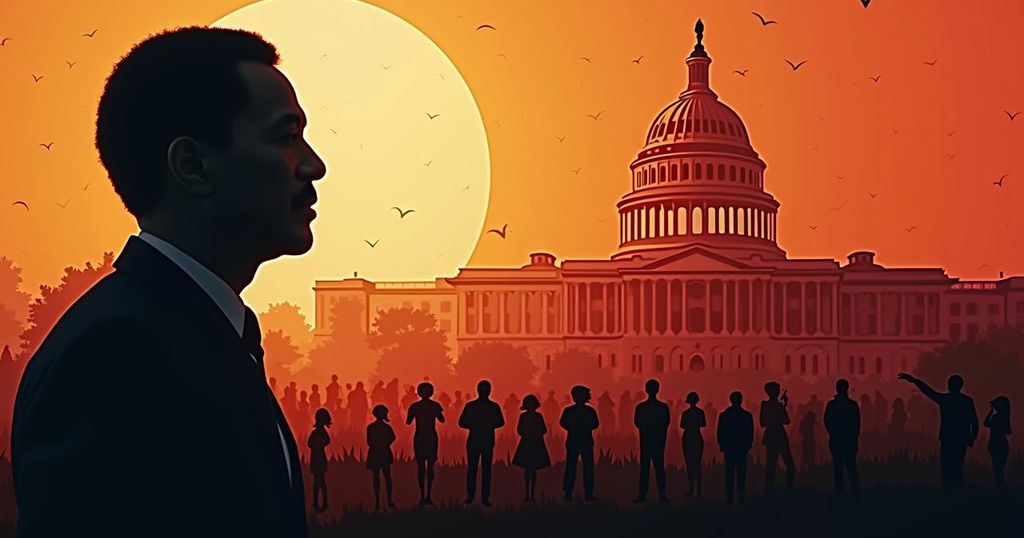The Enduring Legacy of Jimmy Carter’s Presidency in Modern Politics

Former President Jimmy Carter, who turned 100, transformed American politics through the establishment of primaries and debates, influencing how candidates engage with voters and shaping the role of the outsider in contemporary political discourse. Despite only one term, his administration addressed lasting issues, faced significant challenges, and entered the current political conversations as candidates continue to invoke his legacy, particularly in the context of competing as outsiders against the political establishment.
Former President Jimmy Carter, who recently celebrated his 100th birthday, has arguably left a lasting impact on American politics that persists nearly fifty years after his presidency. He ascended to the presidency during the tumultuous times following the Vietnam War and Watergate, effectively transforming the nomination and election of candidates through a system focused on primaries, caucuses, and debates. Notably, he became the first modern political outsider to win the presidency, paving the way for subsequent leaders who embraced similar anti-establishment themes. Despite serving only a single term, Carter’s presidency faced several enduring national challenges, including inflation, energy crises, healthcare debates, and persistent conflicts in the Middle East. His post-presidential endeavors earned him respect across the political spectrum, from humanitarian work to election oversight, even as his presidency served as an illustration of how not to manage intra-party relations—exemplified by his contentious primary challenge from his own party in 1980, which weakened his reelection bid and ultimately contributed to his defeat. Carter’s campaign in 1976 fundamentally altered the Democratic Party’s nomination process, allowing previously overlooked candidates to gain traction through primaries. His grassroots campaigning in these settings enabled him to gain visibility, culminating in a historic nomination and victory over incumbent Gerald Ford. Furthermore, his administration revived general election debates, making them a staple of the democratic process. Domestic conflicts marked his presidency as Carter often clashed with Democratic leaders in Congress, leading to frustrations on both sides that inhibited legislative progress, particularly regarding healthcare and regulatory reforms. Carter’s navigation of complex international challenges, including a significant focus on human rights and the lasting Camp David Accords, has continued to resonate. However, lingering issues such as the Iranian hostage crisis symbolize the difficulties he faced. In the current political landscape, Carter’s presidency is frequently referenced, providing lessons for candidates today. As the 2024 election cycle unfolds, Carter’s legacy persists in the way candidates position themselves as outsiders, a theme used effectively by myriad successors, including Donald Trump and Barack Obama. Meanwhile, President Biden has acknowledged Carter’s profound influence, expressing that his “hopeful vision” continues to guide the nation.
The significance of Jimmy Carter’s presidency is highlighted by his emergence as a transformative figure in American politics, particularly in the restructuring of political candidacy and the nomination process. Serving from 1977 to 1981 during pivotal societal shifts, his tenure parallels many contemporary challenges faced by future presidents. Carter’s electoral ascent was made possible through extensive engagement in primaries, which were previously overshadowed by party elites. Additionally, his approach to governance, marked by an outsider perspective, resonates profoundly in today’s political climate, where candidates often campaign against the established order. The lessons learned from his administration regarding intra-party dynamics and the importance of coalition-building remain relevant to today’s political actors.
In conclusion, Jimmy Carter’s presidency profoundly reshaped the landscape of American political campaigning and candidacy. His innovative use of primaries as a mechanism for nomination set a precedent that continues to reflect in the strategies of modern candidates. His post-presidency endeavors and public service solidify his legacy as a statesman committed to humanitarian causes. As the 2024 election approaches, Carter’s influence serves as a vital reminder of the enduring impact of leadership that seeks to challenge the status quo and address perennial national issues.
Original Source: www.usatoday.com






